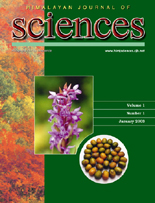Concept of environmental justice in Nepal: Environmentalism of poor for sustainable livelihood
DOI:
https://doi.org/10.3126/hjs.v1i1.186Keywords:
Environmental justice, sustainable livelihoodAbstract
Environmental justice has emerged as a new concept to address environmental problems of grassroots level from the perspectives of affected and less privileged communities or individuals of a society. This paper relates environmental justice as environmentalism of poor to their livelihood security through the access to resources, decision making power and clean and healthy environment. There are several discriminatory and unjust practices in both urban and rural areas of Nepal. Those vary from disproportionate sharing of ecological benefits and hazards in society to the unequal access to resources, healthy environment, decision-making, information and other civil rights. These injustices are mainly rooted in existing social structure with differential distribution of economic and political power. Some approaches are also discussed to correct environmental injustices, which include essential legal, political and social provisions for improved participation, access to information and access to justice. Himalayan Journal of Sciences 1(1): 47-50, 2003Downloads
Download data is not yet available.
Abstract
4720
PDF
2303
Downloads
How to Cite
Ghimire, S. (2006). Concept of environmental justice in Nepal: Environmentalism of poor for sustainable livelihood. Himalayan Journal of Sciences, 1(1), 47–50. https://doi.org/10.3126/hjs.v1i1.186
Issue
Section
Articles




